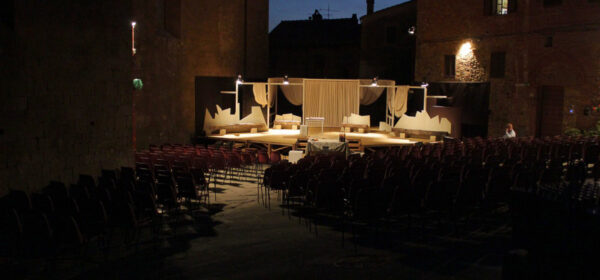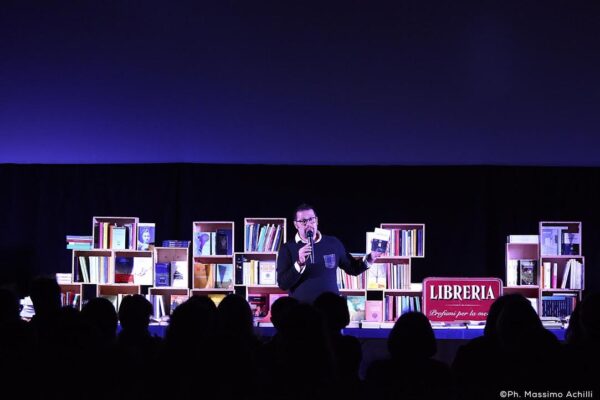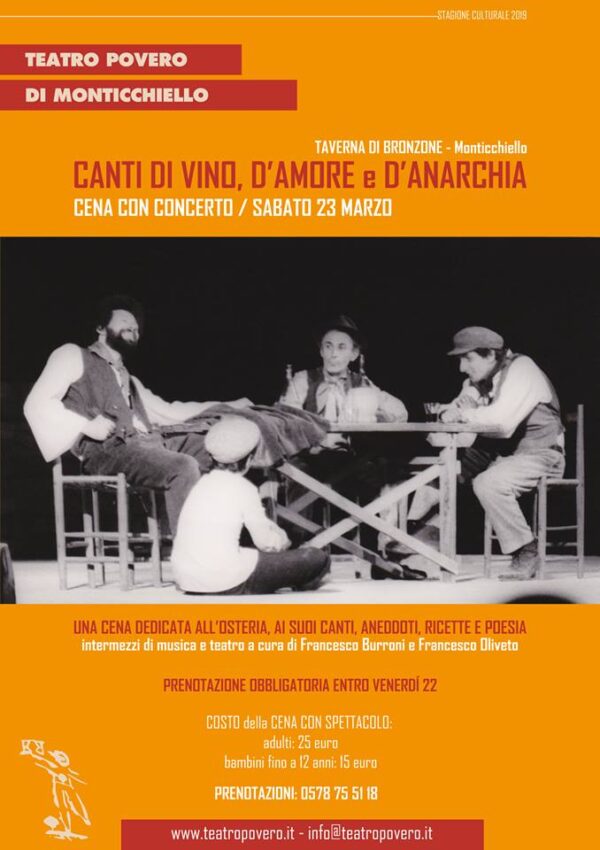In summer 2020, Monticchiello had been hoping to celebrate in its autodramma the fact that the medieval Tower and its land at the very top of the village had finally become public property, an accessible space again, after many decades of being privately owned and off limits. But then in 2020 there were different things to think about.
So this is a ‘promenade show’ in which small groups of spectators, around 15 at a time, are escorted round the village by a Guide, moving from one separate performed scene to another.
Prologue. The audience arrives at the village gate, escorted by a Guide, who asks what the situation is, whether it is permitted to enter. The two sentries on guard at the village ramparts are not entirely clear, and disagree with each other. ‘Who are these people’, they ask, ‘where are they from? Are they healthy?’ If they were ‘spectatorss it would be a problem, because there are strict rules about that, spectators are contagious. The Guide insists that these are not ‘spectators’, but ‘tourists’, who are really welcome, indeed sought after. They could go straight up to the Tower, a real tourist attraction! The sentries start arguing again, but the ‘tourists’ go in and leave them behind.
1. Children’s games. Some children are talking together about the altered rules for playing games with social distancing: games of ‘tag’, hide-and-seek, without anyone touching. Sometimes they seem keen on the new rules, but then they realise it can’t be done. They say to hell with it all, and decide to run off to the Tower garden: if they climb in there, they can do what they like.
2. Scene of the changing rehearsal. Some Teatro Povero actors see the ‘tourists’ arrive—‘tourists’ are defined as people who have come to eat, not to see a show. Can normal life now be resumed? Some villagers are convinced, others (from a window) are more cautious. Can they resume rehearsals, should they prepare a real show, or do it all online? Should they still rehearse that scene about the games they played as children round the Tower, free and undisturbed, away from the grown-ups, ‘isolated’? Or are there now more urgent, relevant things about which to construct a show? They put their masks on, move away, and invite the audience to follow.
3. The missed wedding. Under a closed window, a young man, together with his friend, tries to convince his fiancée to come out of the house, at least so as to meet up with their catering firm. They are negotiating the hire of the Tower garden for their wedding, and they risk losing the substantial deposit. But she doesn’t want to come out. She’s been perfectly OK indoors, she’s got used to it, she’s really liked just being told what to do. The fiancé’s friend tries to persuade that she’d quite like to take a walk round the Tower, undisturbed, at night. She finally agrees to go up there with her fiancé: ‘tomorrow night, when everyone’s in bed’.
4. The spirits which roam the streets. From another window, Gabriella has heard the previous scene, and thinks about how weddings and relationships was conducted when she was young. How things have changed from the old peasant days, when everything was ruled by ritual and poverty. Stories from that time can conjure up ghosts: they come down from the old Tower area, and roam the streets at night. The visitors must be careful.
5. Scene of the landlord’s desk: set in 1920, in sharecropping days. The landlord is seated at his desk, where his peasant tenants come to visit him. First Idro and his wife Liga come with a story about a goose which has laid an enormous egg. What is that all about?
But then another peasant, Beppe, needs money, because his wife is seriously ill, maybe with the Spanish ʼflu which has claimed so many. She needs full-time care, and the medicines are expensive. The landlord listens, apparently sympathetic. Then, however, he opens a book and… ah, there’s a bit of a debt recorded. Years ago Beppe’s father contracted to buy two dairy cows … but he never paid back the loan. Beppe tries to argue that those cows have now grown, have produced milk and calves the profits of which the landlord has always had his share. But that argument is not accepted; and Beppe is suspected of having attended Socialist meetings. His wife will get no help.
6. The financial promoter. On their way, the spectators run into a financial promoter from the International Bank of the Val d’Orcia. His bank has supported the Teatro Povero financially in this unhappy year, and so he has been given a slot in the show. Members of the audience are being offered some loan products exclusively reserved for them: ‘Clay Soil Bonds’, ‘Vintage Reserve Futures’, etc. Monticchiello could get a return on this: the International Bank is approaching the Teatro Povero Cooperative to develop the Tower as a de-luxe Super Spa, targeted at affluent oriental families: the ‘Zen Garden of the Val d’Orcia’. However, they still need to overcome resistance from ‘these pig-headed Valdorcians who won’t uproot from their rock….’
7. The video lesson. A large screen shows the start of a lockdown video lesson. The teacher quickly takes the register… one of the pupils is missing, always the same one, Sandra. Her family can’t afford computer equipment, don’t even know how to turn it on. The teacher gives up, and starts a lesson about Ulysses returning to his island home…
8. The gardener. The group comes upon a cultivated area run by an elderly man, Albo. He wants to pass on his knowledge of sustainable horticulture to young Alessia—who is keen to participate. Because of the pandemic, everything is protected, sterilised, shut into plastic bags. This produces a large amount of polluting material, which they drop on the ground. After their planting, the man and the girl go off pleased and proud, convinced that they have helped the planet; but they leave a large amount of rubbish.
9. The rustic school. We see a village school in the 1950s, in the Val d’Orcia. The very elderly teacher is waiting for the children. Two of them arrive out of breath; Silvestro is always late, because his farmhouse is further away. Here he comes: the teacher scolds and threatens him. He says that he left at dawn, but then one of their pigs escaped and had to be caught; then as he left he came across a fox. So he pelted it with stones, because it keeps eating the hens, it’s a problem. The teacher stops him: ‘all right, all right, the main thing is that you’re here. Now get out the drawings that you were all supposed to do for today’. The boy who came furthest has done a drawing of Monticchiello. But he’s made the Tower immensely tall. The teacher asks him why it’s so high. He answers that he sees it as impossible to get to the top. The teacher smiles: ‘That’s right, carry on like that, you’ll go far’.
10. The Mayor on Facebook. On their way, the spectators pass various points where, on TV screens or projected on walls, they see head and shoulders of a Mayor endlessly occupied in a Facebook broadcast: he doesn’t say anything concrete, just a steady flood of meaningless empty words.
11. The Mayor at home. The Mayor is in fact waterning plants on his balcony, very informally dressed. He refuses to be photographed.
12. A Farewell Song. The group meets a woman man playing a clarinet in the square, rehearsing a piece of music. A villager, Daniele, tells her that she mustn’t play wind instruments, the guidelines say that they spread infection. It emerges that Alfredo has died, leaving as a last wish that the band should play a piece at his funeral. An argument develops: other people come out, all wanting to play even if it’s against the rules. In the end they all play the chosen piece together, and disappear very quickly. It’s possible to break down the fear of playing music, fear of talking, fear of being together.
13. Good-bye. In the square where the theatre stage is usually set up, there is a small platform with a large door built on it. It’s the gate to go out by: having entered by one gate, you exit through another. Behind the door is the future, and the end of the show.
We learn this from an actress, Rosanna, seated on the platform by the door: she ignores the ‘spectator-tourists’, and talks to a single empty chair. She speaks repetitively of what the square should look like on a proper performance night, with the actors taking their bows and thanking the audience. What should she do now with tonight’s audiences (whom she doesn’t seem to see), with you? Send you on your way, to your future, with best wishes. And with thanks for having supported the Teatro Povero, for having made the journey to Monticchiello in these uncertain times.
Scene 13: ‘Good-bye’
Rosanna: It’s nice, this square, isn’t it? Especially on performance nights, with the big stage there at the bottom, the scenery, the lights, the seats in the middle… The actors taking their bow at the end of the show, thanking the audience… it’s even nicer then. But this is how it is now, with this small stage, just one actress. Isolated, set back… and a chair. Just a chair to talk to, like I’ve been doing for days, weeks, months…
I keep wondering why no one comes to see me—now, now that they’re allowed to. Why? Perhaps they’re all still frightened, I can understand that, they have to be careful, or maybe they’ve not got time, they’ve joined the race again, they’re running, running…
(To the empty chair.): Do you remember those blue skies in April? So clear and polished. Outside the house it was all so beautiful. No smoke from chimneys, empty roads, ocean liners in port, aeroplanes grounded. And endless visions of the future. I could see the future. Shut inside my rooms, I saw it. I had it right in front of me, it spoke to me, it explained things, it was clear and polished like the April sky.
Now I can’t see properly any more… it’s all out of focus, scrambled… I can hardly see that chair you’re sitting on… or are you standing up? I’m just here, on my little stage, isolated, set back, waiting… waiting for what? They haven’t told me. ‘Just go on to the stage, and wait. Something will happen.’
Yes, they explained that it wouldn’t be the show we’d intended, the one about the Tower. We’d talk about something different, yes. But they didn’t say exactly what. They didn’t even tell me if there would be anyone to watch me, to listen while I spoke my lines… they haven’t even given me any lines. They explained that it would be a good-bye… that is… I’d have to say good-bye to the audience, at the end, at the moment when they have to leave the square.
(To the empty chair.) Have you seen the show? Have you? Did you see if there was an audience? I’m just staying here waiting until it’s my turn… here… in this square. It’s nice, this square, isn’t it? Or it was before, on performance nights, with the big stage there at the bottom… The actors taking their bow at the end of the show, thanking the audience… that’s a proper good-bye, a normal one… not just me here by myself.
And what am I supposed to say here, on my own, to say good-bye to the audience? I could thank them, yes… that’s right, thank them… for having believed in us… for having believed that we’d manage to do it… and for having come to see us, and hear us, and look us in the eye… a live show… to stand with us and look at the present and the past… to ask ourselves what the future will be… the future of this company, of the theatre, of the country, of all the people, each one of us… instant by instant.
The Tower, it just stays up there, all quite and still… (To the empty chair.) You know the Tower well, don’t you? For us here, for each one of us, it’s a link with all the others, a memory we share, it stands for the togetherness which brings us into this square every year. Where we’ll come back again, when things get back to normal. There, that’s what I’ll say to the audience, when they come… when they find me here, on this stage, isolated and set back.
And only then will I open the door for them (she goes and opens the door) …yes, I’ll open this door, and I’ll invite them to go out, one by one, in line. That’s what I’ll do! And in just an instant they’ll find themselves in the endless space of outside, outside the fiction, outside in reality, in their real life… a life which belongs only to them… and depends only on them… And which I hope they can imagine as being wonderful… just as I see this square as being wonderful… on performance nights, with the big stage there at the bottom, the scenery, the lights, the people, the seats in the middle, the audience, the actors taking their bow at the end of the show, thanking the audience…
Thank you… thank you… thank you… (as the spectators EXIT.)

107759785 1399346326943351 2187431514222488390 o1



